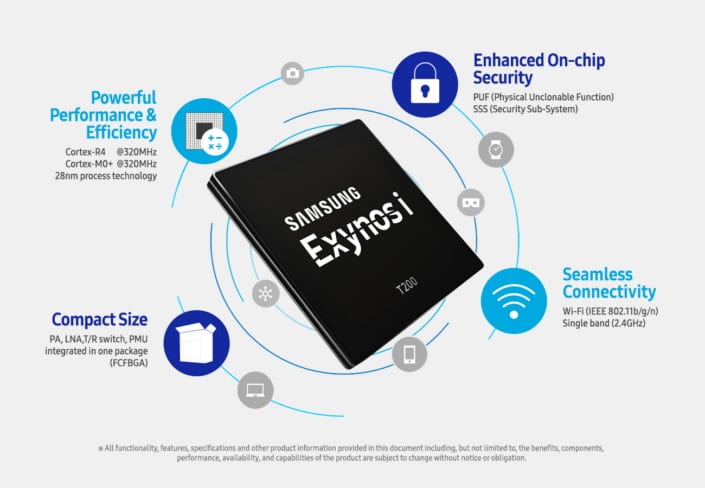Samsung Electronics has made some breakthrough with semiconductor technology. It is estimated that over half of its operating profit for the second quarter of 2017 is from the semiconductor field. It announced today that its maiden Exynos-branded Internet of Things (IoT) solution, the Exynos i T200 chip, has gone into mass production. The Exynos i T200 is considered to be a reliable IoT solution which provides the required performance for IoT use. This chip is designed with the 28-nanometer (nm) High-K Metal Gate (HKMG) process which gives it a high processing ability.
The Exynos i T200 features two high-performance MCU cores which are a Cortex®-R4 processor coupled with another Cortex®-M0+ processor. The Cortex-M0+ can be used for I/O or LED control while Cortex-R4 controls system management. Thus the devices it supports do not need a microcontroller IC in the system. This chip integrates a baseband modem and RF transceivers for 802.11b/g/n single band (2GHz) and provides a reliable wireless connection which received the WiFi Alliance certification. It also has the certification of Microsoft Azure for IoT. Exynos i T200 also integrates power amplifier, low-noise amplifier, and T/R switches for WiFi solution. Furthermore, this chip natively supports IoTivity, which is an IoT protocol standard from the Open Connectivity Foundation (OCF). This ensures a smooth cooperation between IoT devices.
Security and privacy are perhaps the biggest challenges for device manufacturers and the application of IoT. To tackle this challenge, the Exynos i T200 uses a ‘Security Sub-System’ which handles security management. A PUF (Physically Unclonable Functions), and an on-chip IP is integrated into the system to generate a unique key for authentication and data encryption. All these security features are used to ensure a higher level of security compared the traditional OTP-based solution.


















